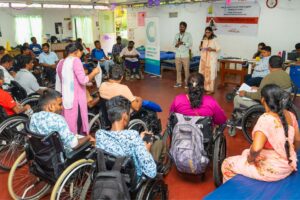The Centre for Law & Policy Research (CLPR), in collaboration with Association of People with Disability (APD), organised an awareness session “Know Your Rights & Entitlements: Legal Rights of Persons with Disabilities” on 3rd September 2025 at the APD Horticulture Training Centre, Bangalore on the occasion of World Spinal Cord Injury Day. The event aimed to equip persons with disabilities, particularly those with spinal injuries, with knowledge about their rights and entitlements under the Rights of Persons with Disabilities Act, 2016 (RPwD Act) with a special focus on their rights to employment and accessibility.

Dr. Kiran Nayak (KVS and CLPR) welcomed the participants, and took them through the agenda for the session. The first session, “Overview and Implementation of the RPwD Act, 2016” was conducted by Priya Chaudhary (Research Associate, CLPR). She provided a comprehensive overview of the RPwD Act, tracing its historical evolution from the Persons with Disability Act, 1995, to India’s ratification of the UNCRPD in 2007 resulting the 2016 Act. She explained the key definitions under the Act, and highlighted the specific rights such as equality and non-discrimination (Section 3), the right to live in the community (Section 5), legal capacity & guardianship (Sections 13-15), education (Section 16-17, 31-32), Accessibility (Section 39-46), and entitlements to social security, health, and rehabilitation (Chapter V), offences and penalties (Chapter XVI), duty of police (Section 7), access to justice (Section 12) along with the grievance redressal mechanisms. This session emphasized how the RPwD Act builds a legal framework for inclusive and full participation, protection from discrimination and recognition of autonomy for persons with disabilities.

In the second session “Right to Employment for Persons with Disabilities”, Nithya Rajshekhar (Senior Research Associate, CLPR) focused on employment rights under RPwD Act and broader challenges faced by the persons with disabilities in the labour market. She explained non-discrimination in the context of employment, and informed participants that government establishments are prohibited from denying promotions, training, or benefits on the grounds of disability, and were mandated to provide a 4% reservation for persons with benchmark disabilities. She also spoke about the obligations on private sector employers to protect and promote the rights of persons with disabilities. Beyond the legal framework, Nithya reflected on persistent structural barriers, including inaccessible infrastructure, inadequate vocational training and attitudinal biases that continues to limit the opportunities for persons with disabilities. She stressed the need for effective policy implementation, sensitization programmes, enabling technology and collaboration with private employers to ensure these rights translate into meaningful employment opportunities.

Following the sessions, there was an interactive question and answer session where participants engaged with the speakers about practical challenges faced in the implementation of RPwD Act and advice on legal remedies for instances of discrimination, while sharing their lived experiences.

